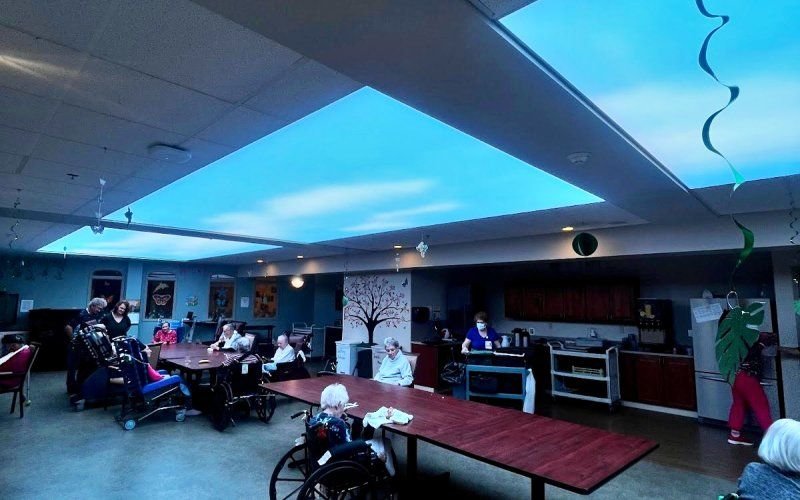MPH Student Brings First Artificial Sky to Capital Region Nursing Home

ALBANY, N.Y. (April 11, 2024) — A Guilderland nursing home installed an artificial sky in one of its patient care wings — the first such facility in the United States to do so — thanks in no small part to the work of Master of Public Health student Alexandra Smith.
For her MPH internship, Smith oversaw the installation and conducted research to evaluate the artificial sky’s impact on residents. The artificial sky is a series of seamless panels that use high-luminance lighting to create an imitation blue sky and sunlight. It uses AI technology to display images that correspond to the time of day, and can display clouds, birds and even sunsets.
But Smith was involved in the sky project even earlier, when she worked at the nursing home, Our Lady of Mercy Life Center (OLOM). Smith, an Albany native, was then a certified dementia practitioner with a master’s in health care administration. She applied for a grant to install the artificial sky, which she thought would be especially beneficial to residents with dementia.
“The memory care unit is on the lower level of the building, which unfortunately does not get much natural light,” she said. “Because dementia also impacts the circadian rhythm, the combined effects can lead to the exacerbation of a lot of the behavioral symptoms of dementia such as depression, anxiety, agitation and aggression.”
The grant was awarded, but the onset of the pandemic delayed the project. By the time the funding for the artificial sky had become available, Smith had moved on to a new position — and had enrolled in the School of Public Health’s online master’s program.
“I chose to pursue an MPH because I wanted to learn more about policy development in hopes of one day enacting meaningful, substantive change on behalf of the geriatric population, specifically those with memory impairment and cognitive health disorders,” she said. “The online MPH program worked best with my full-time career as a nursing home executive director.”
The MPH program also has a required internship, which gave Smith an opportunity to go back to OLOM. “It seemed like a good reason to go back to see my residents and help OLOM finish up the proof of concept of this project,” she said. “I worked closely with the interdisciplinary team at OLOM to collect data pre- and post-sky installation. We wanted to see the impact the sky had on number of falls, antipsychotic usage, resident activity participation, sleep cycles and overall staff satisfaction. We did this using the data that is already collected in the electronic medical records and through surveys and collection tools that I helped develop during the internship.”
So far, the data have shown that the artificial sky is having a positive impact on residents.
“During the study period, there were fewer falls in the area where the sky is installed, better sleep cycles and improved staff satisfaction compared to the other unit on the ground floor, which does not have a sky,” Smith says. “However, not enough data was collected to establish an association between the installation of the sky and the usage of antipsychotic medication or between the sky and specific behaviors of the residents. But OLOM is still collecting data and they are working on answering those questions.”
After completing her internship, Smith says she would recommend the artificial sky to other skilled nursing centers.
“It's cool knowing that we were the first to do it in the U.S.,” she said. “I think it's an important intervention for any resident living in a health care facility that was not designed with the environment or natural conditions that humans need in mind.”




